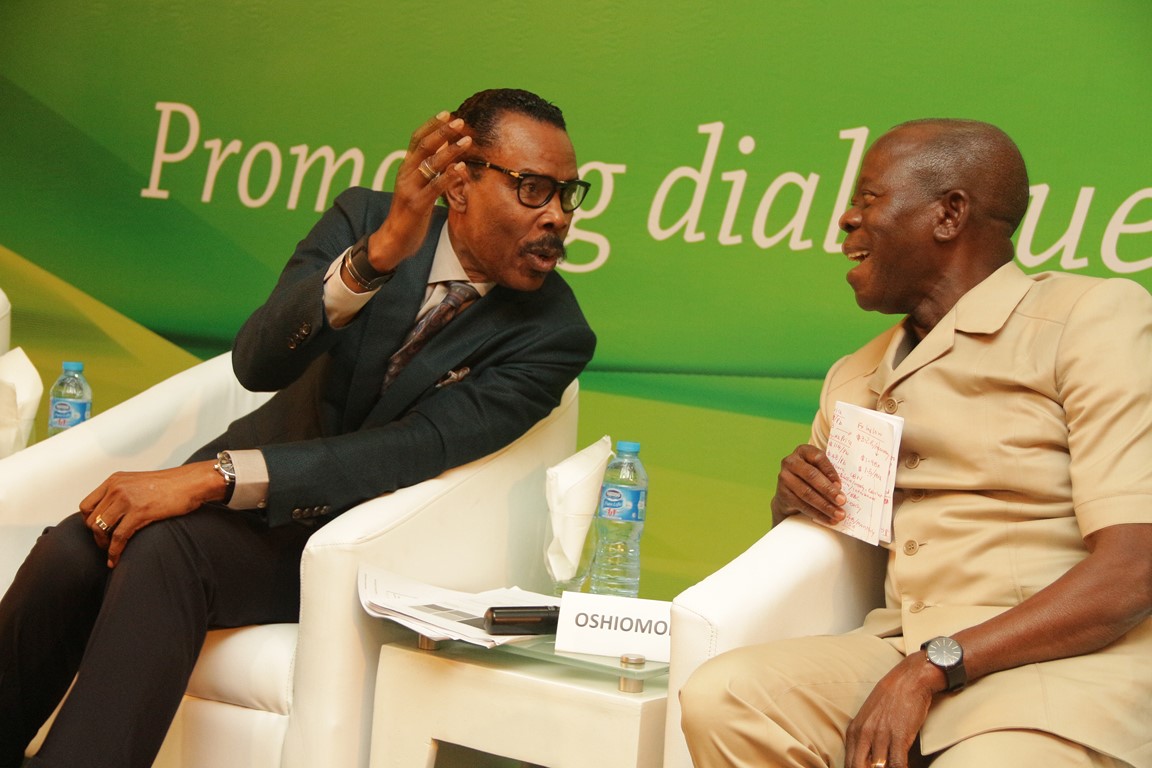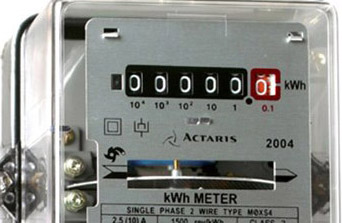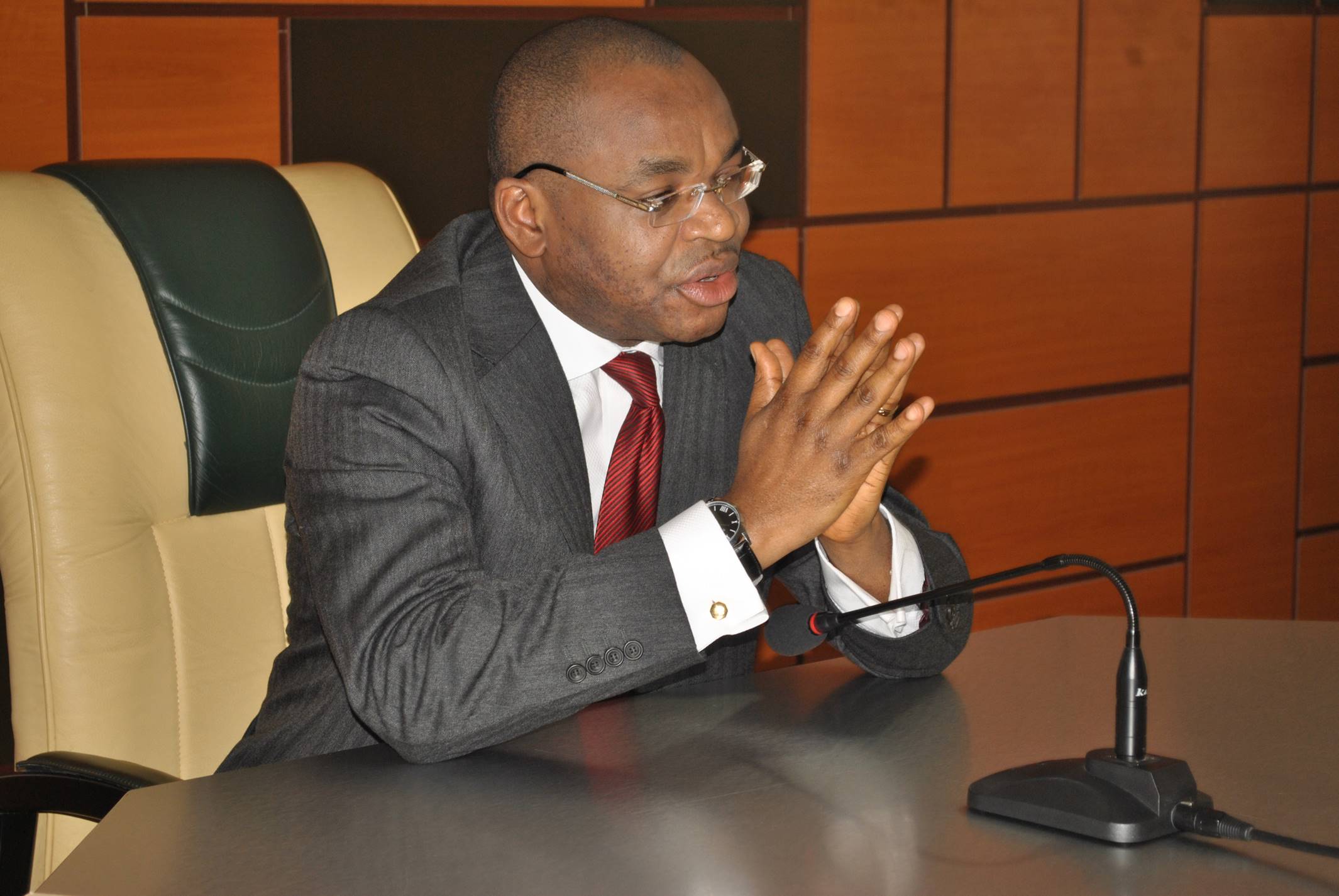By now, I thought I would have a clearer understanding of the best way out of Nigeria’s forex crisis. After listening to contributions from speakers, discussants and the audience at the inaugural TheCable Colloquium on Thursday, I am still nowhere near a definite, logical conclusion. It appears that the more I hear both sides of the argument, the more I am lost. Both arguments appear to be quite convincing — taking into consideration the inevitable fact that every policy has its positive and negative impacts on the people and the economy. For every action, according to Isaac Newton’s Third Law of Motion, there is an equal and opposite reaction.
There are times I wake up in the morning and pitch my tent with the pro-devaluation camp. I look at their key arguments and conclude that they not only make sense, they offer the most natural, or consequential, answers to the problems at hand. But then I’m going to bed at night and anti-devaluation campaigners take control of my mind. If we officially devalue the naira today, the first thing it will hit is petrol price. If you add just N5 to fuel price, the effects on transportation costs and food prices could lead to riots. More so, devaluation does not come with any guarantees, just expectations. It will solve some problems and create new ones.
Having battled within me for months over this debate, I have managed to settle some of the burning issues in my mind which I intend to share with us today. Even though I am still nowhere near a clear picture of the best route out of the crisis, I believe the policy makers must keep an open mind. As Waziri Adio argued in his THISDAY column a couple of weeks ago, there are two ideological positions in the forex debate, with each camp holding on tenaciously to their positions and seeming to ignore that there are downsides to every argument. I think these two camps will have to shift ground and meet somewhere. In the meantime, here are my take-aways so far.
I have concluded that our biggest headache is forex supply. The latent demand for forex on a monthly basis is over $3.6 billion, while the official monthly supply is less than $1 billion. Supply will continue to dry up if oil prices do not have mercy on us, and while many economists reason that devaluation is desirable to curb demand and correct market distortions, the fact is: as long as the supply curve goes downward, the gap between demand and supply will keep widening and the price (exchange rate) will keep going up. If we devalue the naira, therefore, black market will also devalue, except forex supply improves. Hence, if CBN moves to N300, black market could move to N400.
Advertisement
The counter to the “supply crisis” argument is that it is through devaluation that the shortage can be addressed. It is argued that if we devalue, forex demand will automatically fall. Also, we are to expect an inflow of forex through investments, remittances and repatriations. At N197 to a dollar, your uncle in the US will more likely send $10,000 to you by cash so that you can get N3 million in the black market rather than wire it through a bank which will pay you just N1.97 million. A foreign investor knows that his $1 billion is worth N300 billion in the black market but his account will be credited with only N197 billion at the official rate. He would think twice.
Also, an exporter who earned $100,000 on his exports would rather keep the proceeds abroad. If he repatriates the money by official channels, the value would be just N19.7 million, whereas he can get as much as N30 million by selling to Nigerians abroad who need forex. He thus trades with his proceeds abroad, thereby denying Nigeria a source of forex, even though he is a beneficiary of the official rate. The argument, therefore, is that by maintaining this huge gap between official and unofficial rates, we have effectively shut out several sources of autonomous forex inflow. Our reserves won’t grow and parallel rates will keep soaring. Arbitrage will remain untamable.
But there is also a response to this argument. Devaluing the naira does not guarantee inflow of forex because, come to think of it, the US economy and several other economies are offering better returns and stability to investors. Therefore, they will not rush to Nigeria simply because of devaluation. They will look at several variables. It’s a business decision, not community service. After all, several oil-producing countries have devalued their currencies as a result of the crash in crude prices, but the statistics are not yet in their favour. What I can glean from this is that devaluation is just one factor. There are many other factors that come into play in investment decisions.
Advertisement
Another conclusion I have reached is that the speculative attacks on the dollar by currency speculators owe largely to falling oil prices. Even a primary school kid knows that as long as oil prices are falling, forex will continue to be scarce, no matter what the CBN does. The speculators are simply stockpiling dollars ahead of Armageddon — to make a kill. If oil prices recover significantly today, the speculative attacks will subside because speculators know that forex supply will increase and the exchange rate will fall. Using devaluation to whip the speculators into line will work only if supply speeds up and demand slows down. Otherwise, the naira will only keep falling.
One other conclusion I have reached is that because demand for imports is perfectly inelastic in Nigeria, devaluation and CBN’s “demand management” will only scratch the problem on the surface. Devaluation and “demand management” will not reduce monthly demand for forex from $3.5billion to $1 billion. Let’s be clear on that. Today, we have to import virtually every drop of fuel we consume. This consumes nearly 45% of what CBN sells. Furthermore, while we can produce rice here, we do not produce machinery. Import substitution can only work with certain goods. So forex demand will remain very high, only marginally reduced by devaluation.
One more conclusion I’ve come to is that even though we have not officially devalued, general prices have adjusted to black market rate. The inflation we are running from is already here with us. However, fuel prices have not adjusted, neither have the prices of garri and yam. In fact, if we officially devalue the naira today, prices of garri and yam will go up because of the transportation component of cost. This is a typical case of “on the one hand” and “on the other hand” that forced former US president, Harry Truman, to demand: “Give me a one-handed economist!” Pros and cons are, inevitably, a law of nature. You gain on the one hand and lose on the other.
What then? My conclusion is still what it has been since I started writing on the issue: there is no option we choose that will not hurt us. We now have to settle for the lesser evil. Devaluation will probably reduce the pressure on forex and encourage capital inflow, but it will lead to a much higher level of inflation, increase the cost of living and weaken purchasing power. It could stifle industry and lead to job losses as unsold stocks pile up. And while non-devaluation and “demand management” may protect certain goods and services priced at the official rate, CBN certainly cannot cope with forex demand. Speculative attacks, plus arbitrage, will remain ferocious.
Advertisement
Do I now know the lesser evil? No, I still don’t. My challenge to the antagonists and the protagonists, therefore, is that they should provide us with more insight. They should come up with short-term, medium-term and long-term projections, backed with facts and figures, to defend their positions. How will their positions impact on industrialisation and job creation? What will be the costs and benefits on the key rates — inflation, interest and exchange — in the short-run and in the long-run? What are the costs and benefits to the masses? I suspect that many of those who think they have the answer to the forex crisis are only looking at the issues from one angle. They think things are either black or white. What about the complicated grey areas?
AND FOUR OTHER THINGS…
BUDGET BLUES
The 2016 Appropriation Bill is a complete mess. I’m happy that Nigerians are now showing more than a passing interest in the national budget. Kudos to BudgIT and Premium Times for their insight into the warped, wasteful and weird allocations. However, the nonsense, which we all know has been going on for decades, is now being politicised by those who want to scandalise President Muhammadu Buhari by any means possible. This is not about Buhari but a rotten budgetary process. Nevertheless, Buhari has to take the full blame and clean up the mess decisively. That’s what real leaders do. Responsibility.
CHURCH AND STATE
Advertisement
Something revolted in me when I saw the gathering of PDP supporters at the Uyo Stadium last Wednesday to celebrate the victory of the governor, Udom Emmanuel, in his election litigation. Open-air church services to celebrate court judgments are becoming a pattern in PDP states. You may pity the party as it is struggling to stay alive after being disgraced out of power in 2015. Nevertheless, I find it very objectionable the way politicians hide behind God to waste scarce resources. Emmanuel can simply kneel down in his bedroom and thank God rather than hold a politically charged service. Wasteful.
ALUTA APC
Advertisement
When will the APC fully transform to the party in power? It would appear they still think they are in opposition, judging by the regular pronouncements of the party’s stalwarts. They still speak in “aluta” language like student unionists. Typically, an election is only free and fair when APC wins. It has now shifted to the judiciary. If they win a case, the judiciary is wonderful. If they lose, the judges have been compromised. The ongoing co-ordinated and relentless attacks on the Supreme Court are most unfair. You don’t seek to pull down such an institution because a few cases didn’t go your way. Unfortunate.
REBEL OLISEH
Advertisement
Am I surprised by the YouTube outburst of Sunday Oliseh, Super Eagles’ coach, following his frustrations with his employers, the Nigeria Football Federation (NFF)? Oliseh is naturally a vocal personality, and his exile from the national team after the Mali 2002 Nations Cup fiasco was down to his rebellion. He had an ally then in Stephen Keshi, who was the assistant coach and whom he succeeded as chief coach in 2015 after Keshi’s face-off with the NFF. Oliseh certainly has a point against the NFF, but he must learn that as a manager, going public against your employers is a step too far. Brinkmanship.
Advertisement
3 comments








Very insightful article.inview of the above points.i disagree with devaluation.We need to maintaim the steady price of commodities as this has direct impact on low class citizens coupled.Govt should concentrate on infrastructural development that drive investment and reduce importation.
I suggest CBN operates a floating rate, therefore making the rate unpredictable. That way, you have not definitely devalued, and yet you have, depending on the rate announced for that week. That way, you test the repercussions. Whether we shall see an inflow of fx into the economy at periods where the rate announced that period is high.
It is better for us to consumed our locally produced goods/services, by doing this, we can easily reduce the forex wahala on our currency. PMB should lead us by example.